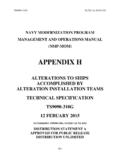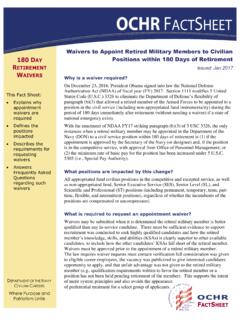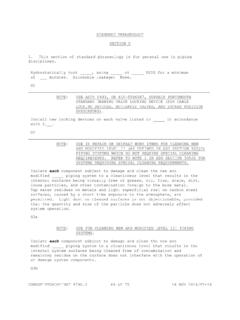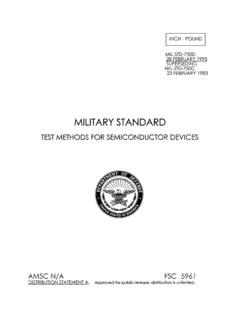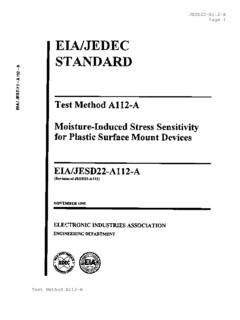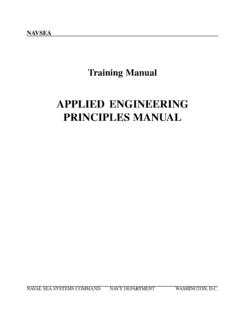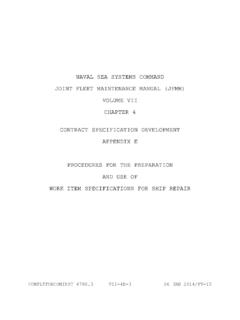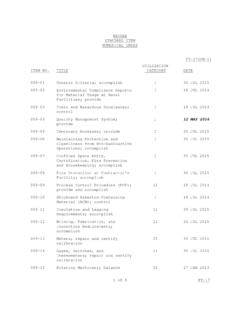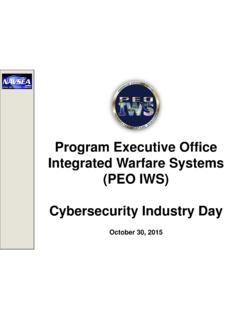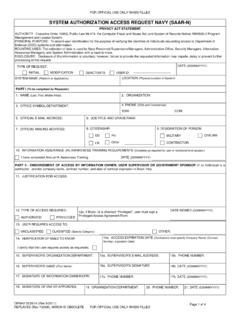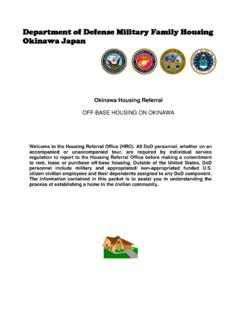Transcription of OVERSEAS ALLOWANCES & BENEFITS
1 SRF-JRMC YOKOSUKA-SASEBO JAPAN. OVERSEAS ALLOWANCES & BENEFITS . Accepting a civil position OVERSEAS and subsequently moving to an OVERSEAS area is a significant decision that will affect you, as well as your family. The following websites provide information on the various aspects of OVERSEAS pay, ALLOWANCES and BENEFITS : o Department of State Standardizes Regulations (DSSR) Website: o Defense Travel Management Office (DTMO) Joint Travel Regulations (JTR) Website: o DTMO Frequently Asked Questions (FAQ) Website: You can find additional information on OVERSEAS BENEFITS and living and working conditions in Japan through the Commander, Navy Region Japan (CNRJ) HRO Website at: Information specific to each base and area can be found at the following Websites: o Yokosuka: o Sasebo: Foreign Transfer allowance (FTA) (DSSR Section 240). A pre-departure subsistence allowance is authorized an employee and each family member for lodging, meals (including tips), laundry and cleaning expenses incurred while residing in temporary quarters for up to 10 days, before final departure from the US permanent duty station (PDS) to the new duty station in a foreign area.
2 FTA cannot begin more than 30 days after vacating the employee's stateside residence quarters. Receipts are required for lodging and meals. Miscellaneous Expense allowance (MEA) (DSSR Section 240). A lump sum miscellaneous expense allowance is to assist with certain miscellaneous relocation expenses that are deemed reasonable and necessary. The following amounts may be granted after arrival OVERSEAS without receipts: 1. No dependents or unaccompanied typically $ (see DTMO FAQ). 2. With dependents and accompanied typically $1,300 (see DTMO FAQ). Temporary Quarters Subsistence allowance (TQSA) (DSSR Section 120). TQSA is intended to assist in covering the OVERSEAS average cost of adequate, but not elaborate or unnecessarily expensive, accommodations in a temporary quarters, plus reasonable meal and laundry expenses for a period not in excess of 90 days. TQSA commences either the date you arrive at the new post, or the effective date of transfer, whichever is later.
3 TQSA will be advanced to you in lump sum in 30-day increments. Please be advised that TQSA will be honored up to the daily maximum rate or the actual expenses incurred, whichever is less. You will be required to submit lodging and meal receipts at the time of reconciliation. Claims for transportation to and from your workplace, comfort items, or telephone calls (including work-related calls) will not be covered under TQSA. See the DSSR Website for the latest information on rates. In most cases, Navy Lodge accommodations are available and are within TQSA rates. Living Quarters allowance (LQA) (DSSR Section 130 & JTR). LQA is a tax-free allowance to pay for living quarters and utilities while OVERSEAS . Eligibility for LQA is based on the employee's status when applying for an OVERSEAS position. Employees hired 1. from stateside will typically receive LQA, but it is important that all employees consult HRO.
4 LQA. will start on the effective date of the housing contract or the 91st day after the commencement of TQSA. LQA can fluctuate as often as every pay period because it is based on the exchange rate. LQA is designed to cover substantially all of the living expenses including rent and standard utilities ( heating fuel, gas, electricity, water, sewage, etc.) and taxes levied by the local government and required by law or custom to be paid by the lessee. Rent may include, in addition to the basic annual rental, the cost of other rentals and fees paid by tenants; employees must consult HRO on this matter. If expenses exceed the maximum LQA an employee is authorized, he/she will be required to pay those expenses on out of pocket. Be advised that an employee may be required to pay the equivalent of four-month's rent when he/she signs an off-base housing contract. These fees normally include first month's rent, the Security Deposit, the Landlord's Fee and the Agent's Fee.
5 Since the Security Deposit is considered a refundable expense, it cannot be included under LQA. Employees may claim payment for the Landlord's Fee and Agent's Fee immediately after signing the house contract by providing HRO the proof of payment for reimbursement. However, these payments may affect the employee's biweekly LQA payment. Employees may also request advance pay to cover the lease expenses. Employees contact HRO before signing rental agreement for information and recommendations concerning the specific situation. HRO will assist employee on ALLOWANCES , entitlements, and submission of necessary forms for reimbursement. Post allowance (PAL) (DSSR Section 220). Post allowance is a non-taxable cost-of-living allowance granted to employees stationed at a post or foreign area where the cost of living, exclusive of quarter's costs, is substantially higher than in Washington, DC. Post allowance is a cost index percentage between the Washington, DC area and the assigned post, and is based upon the number of family members residing at the post, the employee's base salary, and the current exchange rate.
6 PAL amount may increase/decrease without any advance notice based on the exchange rate and adjustments to the cost index. To receive Post allowance , you must submit a completed SF-1190. Post allowance should be requested upon movement from temporary quarters to permanent quarters, or if TQSA is not used, upon arrival at the OVERSEAS duty location. Post allowance is included in your normal biweekly pay. Note: Locality pay is not authorized OVERSEAS . Locality pay will be discontinued on the date an employee enter the rolls of the foreign area activity. Locality pay is not be used in setting pay in a foreign area. Advance of Pay (DSSR Section 850). An interest-free salary advance in an amount of up to three months of pay may be requested no earlier than one month prior to departure from the previous duty station (PDS) and no later than two months after arrival at the foreign duty station. The maximum amount to be advanced will be the employee's base pay for six pay periods.
7 The advance is repaid through equal deductions over the next 26 pay periods. Deductions will begin on the first pay period after the advance is made. The employee must agree to immediate lump-sum repayment of the outstanding balance if employment is terminated prior to liquidation of the advance pay amount. Separate Maintenance allowance (SMA) (DSSR Section 260). SMA is intended to assist in offsetting the additional expense incurred to maintain a separate household. If there is a justifiable reason why eligible family members cannot accompany or 2. remain at an employee's newly assigned OVERSEAS post, the employee may be eligible for SMA. Employees should consult HRO on eligibility. There are two types of SMA: 1. Involuntary SMA For the Convenience of the Government: An agency may authorize SMA. when adverse, dangerous, or notably unhealthful conditions warrant the exclusion of members of family from the area, or when the agency determines the need to exclude family members from accompanying the employee to the area.
8 2. Voluntary SMA For Special Needs or Hardship of the Employee: An agency may authorize SMA when an employee requests SMA for special needs or hardship prior to or after arrival at the foreign post for reasons including, but not limited to, career, health, educational or family considerations for the spouse, children or other family member. After an initial voluntary SMA election, an employee may request a change (commencement/. termination) only once for each member of family during a tour. This change cannot occur during employee's first or last 90 days at post. Student Education Travel for Dependents (DSSR Section 1741). Dependents (up to age 23), who are on the original PCS Orders and present documentation from their school's registrar certifying full-time student enrollment during the term for which travel is requested, are authorized paid Student Travel, limited to one trip per year. Student travel is authorized only between the school and the sponsor's OVERSEAS duty station.
9 Shipment of the student's unaccompanied baggage is authorized. Property Management Service (PMS) Fees (JTR Paragraph 5932). PMS is to assist an employee in offsetting costs associated with retaining a residence at his/her previous stateside permanent duty station (PDS). PMS covers the costs of employing a rental agent, reimbursable up to 10% of monthly rent. PMS can only be authorized only on a residence at an employee's last PDS from which the employee transferred to a foreign area PDS for which the employee and/or a member(s) of the employee's immediate family holds title to the residence. PMS may continue after completing a tour of duty in a service agreement. PMS covers obtaining a tenant, negotiating the lease, inspecting the property regularly, managing repairs and maintenance, enforcing lease terms, collecting rent, paying mortgage and other expenses from rental proceeds and/or the employee's escrow funds, accounting for the transactions and providing periodic reports to the employee, and similar services.
10 PMS must be in the employee's orders and cannot be authorized once the orders are executed. Approval of PMS can take some time, so employees should request PMS at the earliest possible opportunity. PMS is taxable, so employees should consult their tax advisor to determine the tax consequences of these payments and on maintaining the residence as a rental property. Personal Property The shipment to Japan and/or storage of your Personal Property is authorized in your OVERSEAS Permanent Change of Station (PCS) orders. Total personal property is limited to 18,000 pounds. There are three separate categories of Personal Property and hence three pack-outs : 1. Express shipment (or unaccompanied baggage) this is limited to 350 pounds and usually takes approximately 30 days to arrive. Express shipments are for daily living essentials; furniture may not be included. 2. Household goods (HHG) this is the personal property that you will use while you are OVERSEAS ; care should be taken to ensure that you can use what you ship (due to constraints such as the size of rental properties, utilities compatibility, etc).
